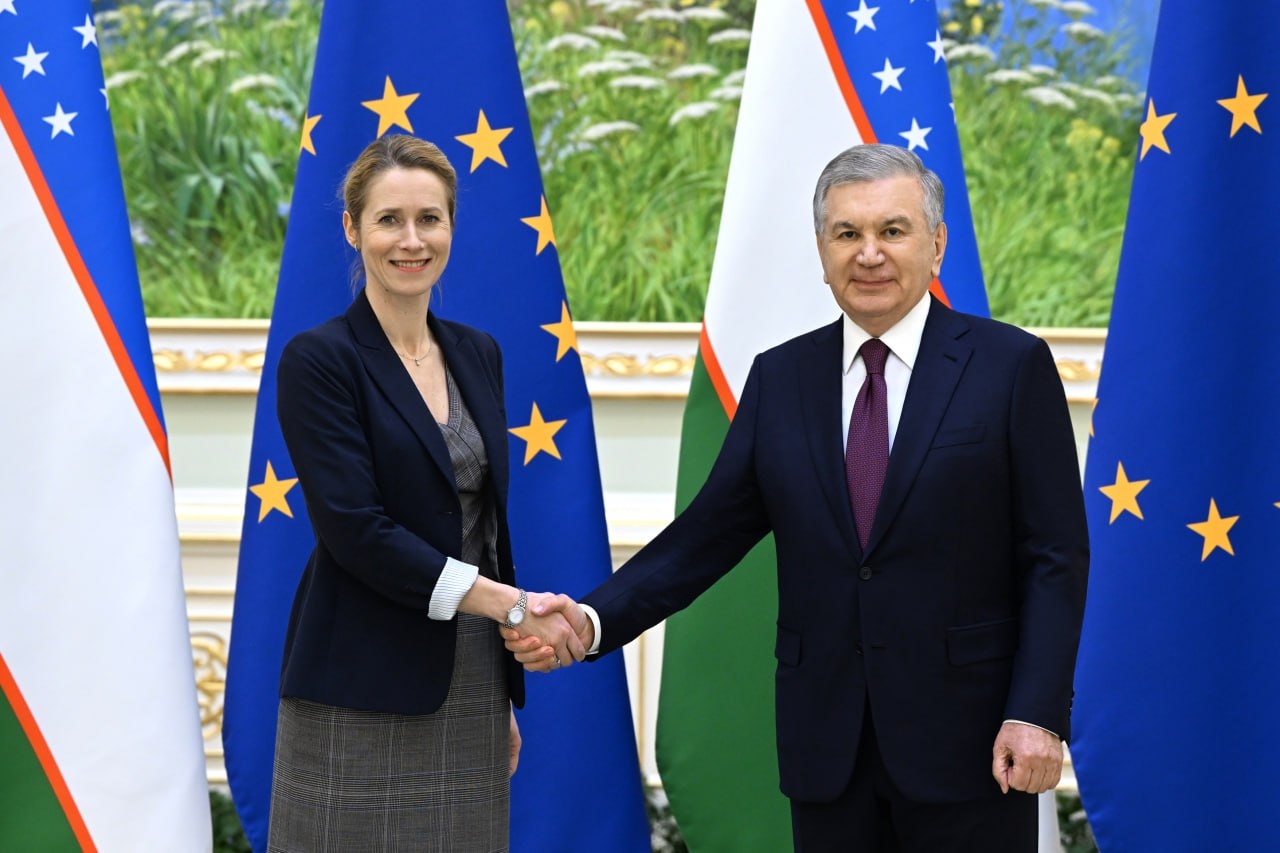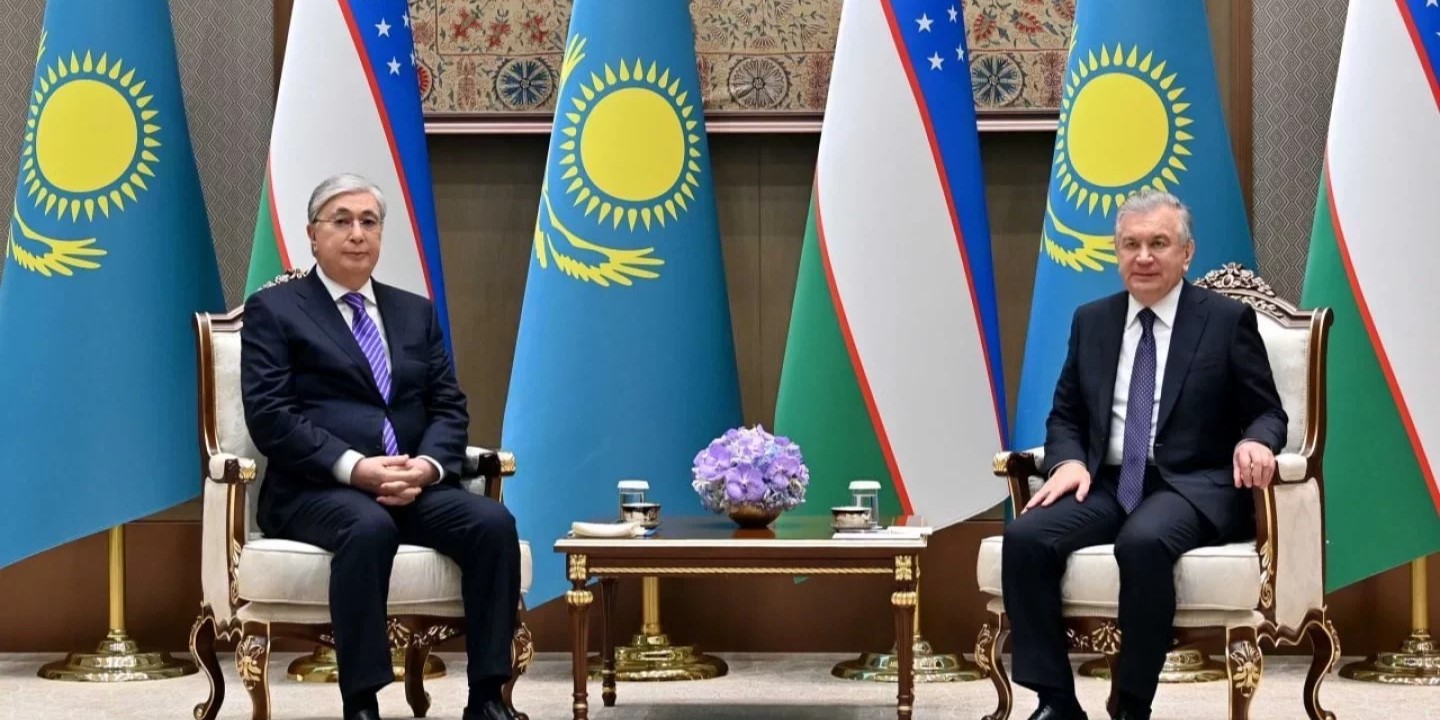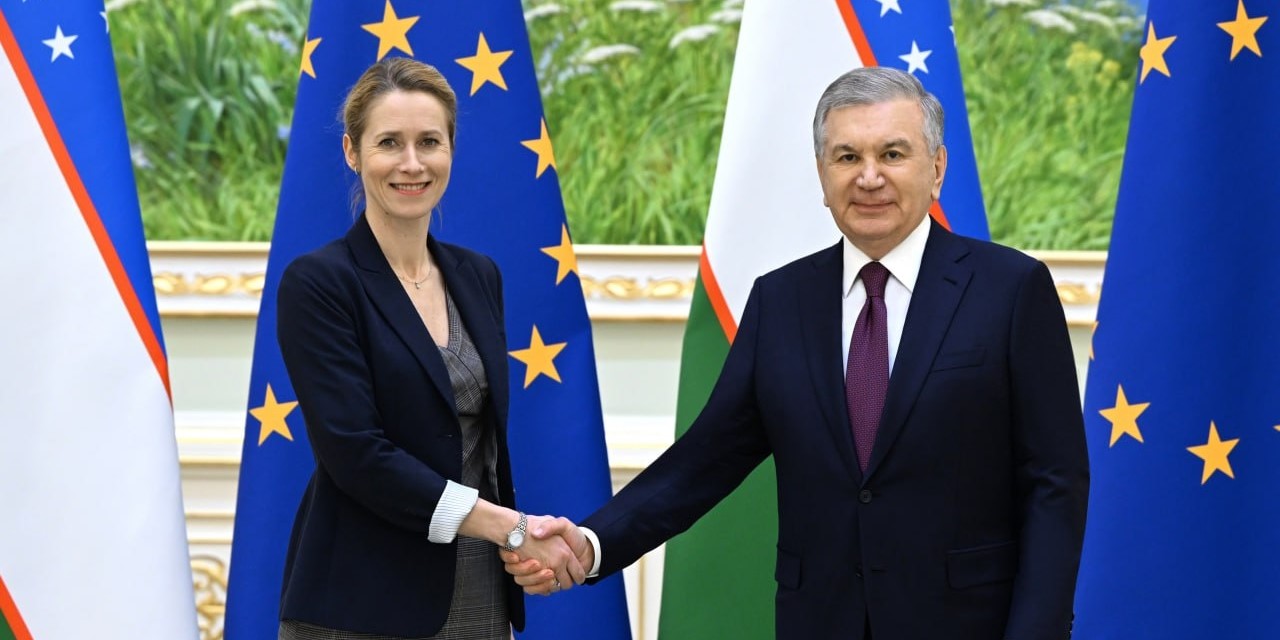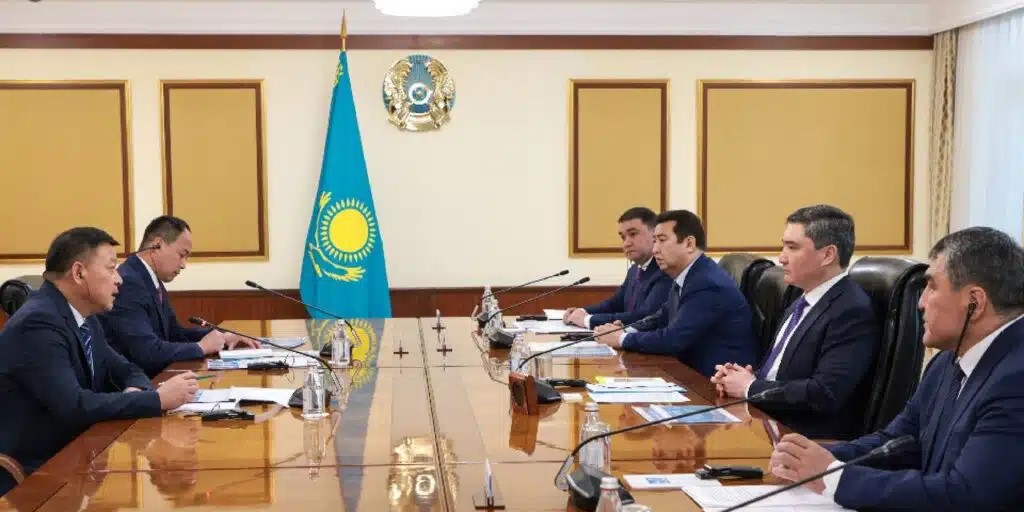Last week, the media across Central Asia covered several crucial diplomatic events, such as President Mirziyoyev’s informal visit to Almaty, EU High Representative for Foreign Affairs and Security Policy Kaja Kallas’ tour of Central Asia, and Kyrgyzstan’s ratification of two border agreements with Tajikistan concerning water and road infrastructure. They also reported on various energy stories, including the decline in Uzbekistani energy output, a British oil and gas firm taking legal action against Kazakhstan, Kazakhstan extending its export ban on petroleum products, the announcement that several Chinese banks will fund the Mulalak HPP in Uzbekistan, and Kyrgyzstan and the EDB agreeing to conduct a pre-feasibility study for the Suusamyr-Kokomeren Cascade HPP. Other sources noted Tajikistan’s plan to establish a benefit distribution fund for revenues generated from the Rogun HPP. Multiple outlets also covered the plans of the Chinese company Xinjiang Lihua for a new cotton and textile plant in Turkistan.

The EU’s High Representative for Foreign Affairs and Security Policy, Kaja Kallas, toured Central Asia last week. Source: Eurasianet
Diplomatic Events
Uzbekistani President Shavkat Mirziyoyev visited Almaty on March 29 (The Astana Times). He held informal talks with his Kazakhstani counterpart, Kassym-Jomart Tokayev, during his brief visit. The two leaders discussed future political and economic collaboration in trade, investment, transport, tourism, and water. They also noted how their bilateral relationship has developed in recent years and how these informal meetings could further boost coordination. Both Presidents later toured several sites around Almaty and attended an exhibition on AI. The meeting comes several days before the first EU-Central Asia summit in Samarkand.

Uzbekistani President Shavkat Mirziyoyev paid an informal visit to Almaty. Source: Orda
The EU’s High Representative for Foreign Affairs and Security Policy, Kaja Kallas, toured Central Asia (The Times of Central Asia). Her visit comes ahead of the first EU-Central Asia summit next week. Firstly, she chaired the 20th EU-Central Asia Foreign Ministers’ Meeting in Ashgabat. Besides addressing the impact of the EU’s sanctions against Russia on the region’s economies, they discussed the EU-Central Asia roadmap previously adopted in Luxembourg in 2023. Moreover, they explored trade, transport, and digital connectivity as part of the EU’s Global Gateway Initiative. She confirmed that the EU and international financial institutions are ready to invest over $10 billion in developing the Trans-Caspian International Transport Route (The Caspian Post). She also met with Turkmenistani President Serdar Berdimuhamedov. Next, she visited Tashkent, where she held discussions with Uzbekistani President Shavkat Mirziyoyev. They considered deepening cooperation in trade, digitalisation, transport, and green energy. They also explored a possible new enhanced partnership agreement and Uzbekistan’s accession to the WTO. In Astana, she met with Kazakhstani President Kassym-Jomart Tokayev. They discussed the finalisation of the visa facilitation agreement, which will simplify the Schengen visa process for Kazakhstanis, and the EU’s Global Gateway Initiative, which is expected to provide internet access to 300 rural villages and 2000 schools in Kazakhstan this year (Orda.kz).

The EU’s High Representative for Foreign Affairs and Security Policy, Kaja Kallas, toured Central Asia last week. Source: Eurasianet
On March 27, Armenian Foreign Minister Ararat Mirzoyan visited Astana (KazTAG). During his visit, he met with his Kazakhstani counterpart Murat Nurtleu (Kazinform). The two Foreign Ministers assessed the development of bilateral relations and discussed trade, political, and humanitarian cooperation. Foreign Minister Nurtleu noted that over 100 companies in Armenia had received investments from Kazakhstan, while 430 Armenian companies are operating in Kazakhstan. While in Astana, Foreign Minister Mirzoyan also met with Kazakhstani President Kassym-Jomart Tokayev, who welcomed the completion of negotiations on a peace agreement between Armenia and Azerbaijan (KazTAG).
Kyrgyzstan has ratified an agreement with Tajikistan on access to water facilities along their shared border (24.kg). On March 26, President Sadyr Japarov signed the ratification law passed by the Zhogorku Kenesh, the Kyrgyzstani Parliament, on March 19. The agreement aims to guarantee access to water and energy facilities located on the territory of both countries. For instance, the agreement outlines the joint operation of the head dam and water intake of the Ak-Tatyr/Machoi canal. President Japarov also ratified an agreement on road use. The agreement provides for the movement of both countries' citizens across their shared border and the construction of two neutral roads. These roads include the Dacha - Kapchygai (Khojai Alo - Vorukh) bypass, which Tajikistan will use, and the Min-Oruk -Samarkandek (Orieno - Shuriston) bypass, which Kyrgyzstan will use. Under the agreement, the intersection of the Osh - Razzakov and Isfara - Vorukh highways will also become a neutral area.
Agriculture
According to a report from the Institute of Macroeconomic and Regional Studies, Uzbekistan’s gross agricultural output reached $35.1 billion in 2024, an 18.5% increase over the last five years (Daryo). They noted that the country’s agricultural output surpasses all other regional states. The World Bank has also reported on the efficiency of Uzbekistan’s agricultural sector, remarking that the value added per agricultural employee is 4.4 times the global average. Per capita production continues to rise despite rapid population growth. In the last five years, per capita grain production grew by 7.6% to 238.2 kilograms, potatoes by 8.7% to 100 kilograms, vegetables by 6.7% to 322.7 kilograms, fruit by 7.4% to 88 kilograms, meat by 7.5% to 79.2 kilograms, milk by 4.9% to 334.8 kilograms, and eggs by 2.4% to 236.9 kilograms. In 2025, Uzbekistan will cultivate 4.8 million hectares and organize agricultural output around ten key food items to ensure stable food supplies.
Nuclear Energy
The Uzbekistani uranium producer Navoiyuran has signed a $9 million deal with the Kazakhstani company TOO Logistic Centre to export uranium to France through Russia (Kun). The company will transport 500 containers weighing 6000 tons from St. Petersburg to Malvési. They plan for the shipments to be completed by the end of the first quarter of 2026. This agreement follows President Mirziyoyev’s visit to France in March, where he and President Macron signed a declaration on strategic cooperation and a cooperation program containing €6.5 billion worth of joint investment.
Oil and Gas
Last week, Uzbekistan’s Statistics Agency released industrial production data for the first two months of 2025 (Daryo). According to its report, natural gas, gasoline, and diesel production declined. The production of gasoline dropped from 241.1 tons to 189.4 tons, while diesel fuel production fell from 123.1 tons to 74.5 tons. Meanwhile, natural gas production hit a new historic low. In January-February 2025, Uzbekistan produced 7.4 billion cubic meters of natural gas, compared to 7.7 billion during the same period in 2024 and 8.2 billion in 2023. Electricity production also decreased despite the growing demand. Uzbekistan generated 14 billion kilowatt-hours in January and February, down from 14.6 billion in the same period in 2024. Earlier, we reported that despite falling natural gas production and increasing imports from Russia, Uzbekistan continues to export natural gas to China.
The British oil and gas company Victoria Oil and Gas has filed a multi-million dollar lawsuit against Kazakhstan with the International Centre for the Settlement of Investment Disputes (Kursiv). They accuse Kazakhstan of violating the Energy Charter Treaty, an international agreement that governs international cooperation in the energy industry. Specifically, they are taking legal action against Kazakhstan because of the cancellation of a contract to develop the Kemerkol field in the Atyrau region and claim damages of $500 million. However, the field is not considered economically significant, containing only 15 million barrels of oil. In 2005, they bought a 100% stake in the field from Saga Creek Gold Ltd. for $8.5 million. However, the Kazakhstani government terminated the contract in 2008 without giving a reason. In the same year, the government transferred the field to Bakyt Tau LLP for $713,983. In 2016, they sold the field to Ap-Nafta Operating LLP for $2.7 million.
From March 29, Kazakhstan extended its ban on fuel exports (24.kg). The ban will affect the export of gasoline, diesel fuel, and other petroleum products. The ban will be in effect until June 30 and include EAEU member states. Lubricating oils, fuel in vehicle tanks provided by the vehicle manufacturer, aviation fuel used for research and development, and petroleum products exported as part of humanitarian aid are exempt from the ban. The ban aims to stabilise domestic prices, reduce smuggling, and prevent the re-export of petroleum products it receives from Russia duty-free.
Hydropower
Chinese banks will finance the construction of the Mulalak hydropower plant (HPP) on the Pskom River in Uzbekistan (Kun). The Deputy Chairman of Uzbekhydroenergo, Farrukh Nurullaev, confirmed that according to the agreement concerning the project, the new HPP will be funded by loans from Chinese banks and constructed by a Chinese contractor. He noted that the government was currently finalising the necessary agreements with the authorities. There will then be a tender process for qualified Chinese companies wishing to participate in the project. He also added that the Pskom and Chatkal HPPs to be built upstream of the Charvak reservoir have been reviewed, and the technical and feasibility surveys completed and approved by the government. Lastly, he outlined that the government included 15 hydropower projects in the state investment programme for 2025 and has allocated $248 million to them. These projects aim to increase the amount of electricity generated from hydropower by 10% compared to the previous year. In 2024, Uzbekhydroenergo generated 8.2 billion kilowatt-hours, an increase of 20% as the number of HPPs it operates grew to 77.
The Eurasian Development Bank and the Kyrgyzstani Ministry of the Economy and Commerce have agreed to conduct a pre-feasibility study of the Suusamyr-Kokomeren Cascade HPP (The Times of Central Asia). This agreement marks a significant step forward in one of Kyrgyzstan’s most ambitious hydropower projects. The cascade will comprise three HPPs along the Kokomeren River, generating 1035 MW. The project aims to address the country’s growing energy needs and aging infrastructure. The pre-feasibility study will estimate preliminary capital expenditures, develop key technical solutions, assess environmental and social impacts, and outline necessary state support for successful implementation.
Manufacturing
Kazakhstani Prime Minister Olzhas Bektenov recently met Zhang Qihai, CEO of the Chinese company Xinjiang Lihua, which specialises in cotton processing (Kursiv). They discussed the company’s plans to construct a large cotton and textile factory in the Turan Special Economic Zone in Turkistan. The project is valued at $396 million and involves establishing a fully closed production cycle, including growing cotton on 50000 hectares, processing, and manufacturing. The company plans to build four processing plants, two plants for drip irrigation equipment, and four textile factories, creating 3000 permanent jobs. Construction has already commenced on the textile plants and the irrigation network. Production is expected to begin in October 2025.

Kazakhstani Prime Minister Olzhas Bektenov met with Zhang Qihai, CEO of the Chinese company Xinjiang Lihua. Source: Kursiv
Economic Forecasts
Freedom Finance Global reported low consumer confidence in Kazakhstan (Kursiv). In February 2025, their Consumer Confidence Index remained static compared to January, marking the second consecutive month it hit a historic low. They noted that economic forecasts, particularly inflation estimates, worsened for the fourth month due to rising official inflation and poor export forecasts. However, inflation and devaluation expectations remained steady. The share of people who believe the economic situation will improve fell from 45% to 40%. Meanwhile, the share of people indicating a steep rise in prices over the past month rose from 51.8% to 55.1%. The share of people expecting a substantial increase in prices over the next month increased from 23% to 24.5%; however, those expecting a sharp rise in the next year fell from 26.3% to 25.5%. Specifically, people expressed increasing concern over food prices and utilities. The only bright spot in the survey was a slight recovery in sentiment about large purchases. Despite the stability in consumer confidence in February, the worsening of inflation could dampen confidence in the near future.
Government Finances
Tajikistan will establish a fund to distribute Rogun HPP revenues (centralasianlight.org). The funds will go towards implementing a benefit distribution programme, which the government is yet to approve. During a recent shareholders' meeting of Rogun HPP LLC, they discussed the allocation of revenues from electricity sales to social programmes. The Energy Ministry emphasised that the funds would be used to benefit the population who previously bought shares in the enterprise. The construction of the Rogun HPP is ongoing. However, the Energy Ministry maintains that 50% of the work has been completed. Six international developmental financial organisations are supporting the project, and the government has spent $818 million on the plant in the past two years.
Mining
The Minister of Natural Resources, Ecology and Technical Supervision of Kyrgyzstan, Meder Mashiev, announced that the Chinese company Zhong Ji Mining will begin developing the Bozuchuk site at Solton-Sary gold deposit in Naryn in 2025 (24.kg). The company recently completed the construction of a plant at the site. The Minister also revealed that the company has committed to extracting 3.4 tons of gold this year. There are 2-3 other deposits where production has been delayed for several reasons, including the Chaarat deposit in Chatkal district, which is estimated to contain over 100 tons of gold. The British company Chaarat Zaav has received a license for this field and will begin mining in 2-3 years.
Remittances
In 2024, Kyrgyzstan was the only country where the volume of remittances from Russia increased compared to 2023 (24.kg). Between January and November 2024, remittances from Russia to Kyrgyzstan increased 12% to $2.6 billion compared to the same period in 2023. Meanwhile, remittances to Armenia fell by 13% from $3.6 billion in 2023 to $3.2 billion in 2024, to Kazakhstan by 45%, and Georgia by 65%.

